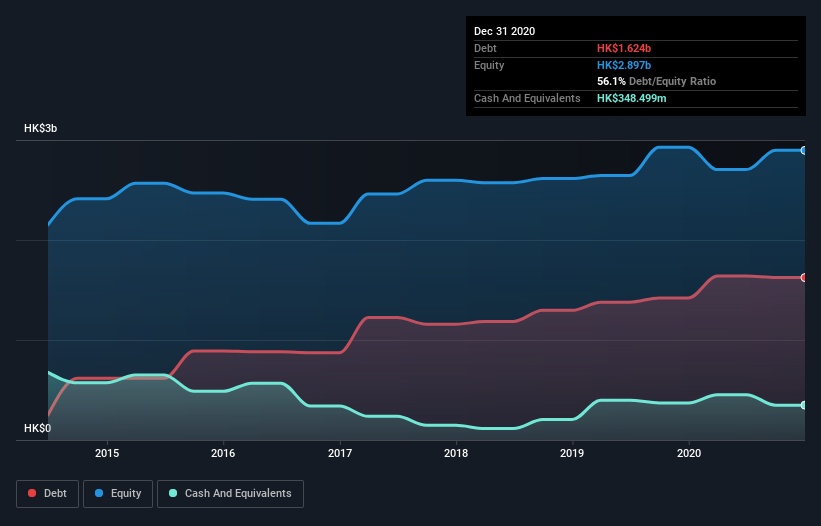Warren Buffett famously said, 'Volatility is far from synonymous with risk.' It's only natural to consider a company's balance sheet when you examine how risky it is, since debt is often involved when a business collapses. We note that Symphony Holdings Limited (HKG:1223) does have debt on its balance sheet. But should shareholders be worried about its use of debt?
What Risk Does Debt Bring?
Generally speaking, debt only becomes a real problem when a company can't easily pay it off, either by raising capital or with its own cash flow. If things get really bad, the lenders can take control of the business. However, a more common (but still painful) scenario is that it has to raise new equity capital at a low price, thus permanently diluting shareholders. Having said that, the most common situation is where a company manages its debt reasonably well - and to its own advantage. The first step when considering a company's debt levels is to consider its cash and debt together.
Check out our latest analysis for Symphony Holdings
How Much Debt Does Symphony Holdings Carry?
You can click the graphic below for the historical numbers, but it shows that as of December 2020 Symphony Holdings had HK$1.62b of debt, an increase on HK$1.42b, over one year. However, it also had HK$348.5m in cash, and so its net debt is HK$1.28b.

How Healthy Is Symphony Holdings' Balance Sheet?
The latest balance sheet data shows that Symphony Holdings had liabilities of HK$925.6m due within a year, and liabilities of HK$1.50b falling due after that. Offsetting this, it had HK$348.5m in cash and HK$449.0m in receivables that were due within 12 months. So its liabilities outweigh the sum of its cash and (near-term) receivables by HK$1.62b.
This deficit is considerable relative to its market capitalization of HK$2.50b, so it does suggest shareholders should keep an eye on Symphony Holdings' use of debt. This suggests shareholders would be heavily diluted if the company needed to shore up its balance sheet in a hurry. When analysing debt levels, the balance sheet is the obvious place to start. But you can't view debt in total isolation; since Symphony Holdings will need earnings to service that debt. So when considering debt, it's definitely worth looking at the earnings trend. Click here for an interactive snapshot.
Over 12 months, Symphony Holdings made a loss at the EBIT level, and saw its revenue drop to HK$352m, which is a fall of 9.4%. That's not what we would hope to see.
Caveat Emptor
Over the last twelve months Symphony Holdings produced an earnings before interest and tax (EBIT) loss. To be specific the EBIT loss came in at HK$72m. Considering that alongside the liabilities mentioned above does not give us much confidence that company should be using so much debt. So we think its balance sheet is a little strained, though not beyond repair. However, it doesn't help that it burned through HK$8.3m of cash over the last year. So suffice it to say we do consider the stock to be risky. When analysing debt levels, the balance sheet is the obvious place to start. However, not all investment risk resides within the balance sheet - far from it. Be aware that Symphony Holdings is showing 2 warning signs in our investment analysis , you should know about...
If you're interested in investing in businesses that can grow profits without the burden of debt, then check out this free list of growing businesses that have net cash on the balance sheet.
When trading stocks or any other investment, use the platform considered by many to be the Professional's Gateway to the Worlds Market, Interactive Brokers. You get the lowest-cost* trading on stocks, options, futures, forex, bonds and funds worldwide from a single integrated account. Promoted
New: Manage All Your Stock Portfolios in One Place
We've created the ultimate portfolio companion for stock investors, and it's free.
• Connect an unlimited number of Portfolios and see your total in one currency
• Be alerted to new Warning Signs or Risks via email or mobile
• Track the Fair Value of your stocks
This article by Simply Wall St is general in nature. It does not constitute a recommendation to buy or sell any stock, and does not take account of your objectives, or your financial situation. We aim to bring you long-term focused analysis driven by fundamental data. Note that our analysis may not factor in the latest price-sensitive company announcements or qualitative material. Simply Wall St has no position in any stocks mentioned.
*Interactive Brokers Rated Lowest Cost Broker by StockBrokers.com Annual Online Review 2020
Have feedback on this article? Concerned about the content? Get in touch with us directly. Alternatively, email editorial-team (at) simplywallst.com.
About SEHK:1223
Symphony Holdings
An investment holding company, engages in the operation of sports brands and retail business in the People's Republic of China, Hong Kong, the United States, other Asian countries, and internationally.
Excellent balance sheet with very low risk.
Market Insights
Community Narratives



